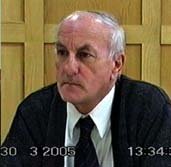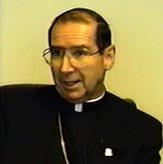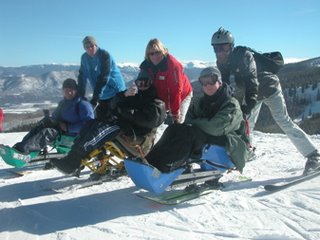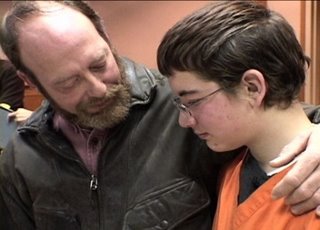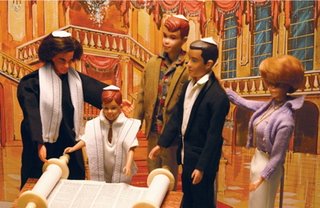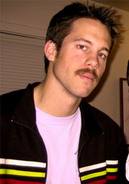
Introducing the
Mill Valley Film Festival screening of
Babel, Alejandro González Iñárritu thanked the programmers of the festival for making it possible for he and his family to be in attendance. He added it was the first time he would be receiving an award in recognition of the body of his work. "I can't believe it still," he admitted, "I'm too young, I think." His audience laughed. Notwithstanding, he felt proud and claimed he would never forget this important, special moment in San Francisco, a city that he loved.
I suspect Mill Valley residents cringed a bit to be conflated with the city across the bay, but, no one dared object outloud. They politely allowed Iñárritu his reminisces of first learning about San Francisco through his father's Scott Mackenzie and Tony Bennett records and applauded his acknowledgment of his wife and children in the audience and how pleased he was to have them sharing this experience with him.
He said all three of his films were dedicated to family members;
Babel specifically to his daughter and son. "As you know," he prefaced, "
Babel is the third and last piece of a trilogy that I started with
Amores Perros and
21 Grams. I call them a trilogy because, basically, the three films are about parents and children. Beyond the fact that the first one was in a local perspective, the second was my first foreign film in another culture, another language."
Babel travels further, beyond even the implicit political and social comments within the film, to address global concerns. "Part of the stories," Iñárritu explained, "and all of the structure and form of the art has to deal with the same elements. I think the three of them deal with the same but at the end
Babel—the film that we will see—for me is basically a quartet, basically about four stories about parents and children, those intimate and complex relationships in which I think we can find everything—all the drama, all the joy, all the hope, all the pain, all the complexity" within which Iñárritu believes human beings are confronted with the best and the worst of themselves. "For me, as a parent, it's the most challenging."
Babel is a film that took Iñárritu nearly one year to shoot over three continents, four stories, five languages. Basically for Iñárritu,
Babel is a film about borders—not necessarily the physical ones constructed by governments and memorialized by maps, which he asserts are not important—but, the truly important, more dangerous borderlines constructed within ourselves. Ironically enough, when he started shooting
Babel, he thought the film would be about the differences that separate human beings. Instead, as he and his family experienced the making of the film, as they traveled to the film's various locations, their compassion was toggled by their exposure to—not only the film's characters—but the communities they encountered. Everyone associated with the film was transformed by the experience of making the film. The film itself, he qualified, transformed itself and he ended up making a film quite different from his original intention. By the time he reached the editing room, he realized
Babel was not about the differences that separate human beings, but about what connects human beings, which in essence is their humanity.
Babel comments upon the compassion that Iñárritu is concerned we have lost. When people become overly critical, when they become judgmental, they lose compassion. Iñárritu hopes audiences will see that
Babel is about human beings, not about Japanese or Mexicans or Americans or Moroccans. That's one of the aims he was trying to accomplish.
Babel is Iñárritu's first film with non-actors. Complementing the established names that propel the story forward are real people from the filmed communities who had never seen a movie camera in their life. Admittedly, their participation was a fortuituous accident. The day before he started shooting in Morocco, Iñárritu had only the big names in place and didn't have a single actor for the subsidiary roles so he went to the local mosque where the
imam announced by speakers an open call for participants. The experience was such a positive one for him that he elected to replicate the process in Mexico.
"This is a film where I tried to take out ideologies," Iñárritu expanded, "because I think ideologies have been hurting the world." Children also have a big part in
Babel because Iñárritu believes children around the world have been paying the consequences of adults who have not been solving the problems associated with borderlines.
Following the screening, festival director Mark Fishkin joined Iñárritu on stage to facilitate the Q&A. Fishkin began by noting how the relationship between parents and children was so strong in
Babel and that—though all the themes in the film prove universal—could Iñárritu comment in particular upon what he was exploring in the parent-child relationship?
Iñárritu conceded that most audiences might not be able to look past "the political thing, the governments." What happens between governments and cultures, however, happens between people close to you, your wife or your kids. Iñárritu is now a ripe 43 years of age while his father is 78. He has a great relationship with his father but now also a growing relationship with his own daughter and son. He finds himself "in the middle of this mirror." He looks up and sees his father and, whether he wants it or not, he is aware of becoming his father. Then when he looks "down the other mirror" where he projects himself, he sees his kids becoming like him, "which is really scary." Whether this process is good or bad pales against its complexity. Sometimes, Iñárritu suggested, you can't explain things to your children, let alone yourself. You can't explain why they should not be like you are.
These complexities are what strike Iñárritu as human. Tolstoy wrote in
Anna Karenina that what makes families similar is their happiness, but Iñárritu completely disagrees; he believes that what really makes families similar is what makes them miserable and sad, their shared pain. That pain stems from our inability as human beings to give love and receive love. That inability is the most tragic thing that can happen to a human being and children especially—being fragile and vulnerable—are the ones most hurt by this tragic inability. When these truths are exposed on the screen, when audiences watch characters suffer these themes, that's when they suddenly realize and reflect upon what is important in life.
Fishkin stated that he had read that—for Iñárritu—
Babel was a journey in the making, four different countries, five different languages, not only did the characters transform themselves but the actors and the crew and Iñárritu himself transformed as well. He enquired how the process had affected Iñárritu?
Iñárritu responded that it took him two years alone to develop the script and, by the time he was finished working with the film, he had spent three years and a half. When he started the project, he was a different person. As arduous as script development had been, the shooting was equally intense. "When you shoot these scenes in the morning, you got those scenes with you at night. You know what I mean? You can't sleep." He wished he could have been like those doctors who perform brain surgery and walk away without caring. He wished he could have detached himself from the movie as professionally as he should. He wished he could have been like a psychiatrist or psychologist who listens to you and then goes to your house for dinner. But you can't do that with filmmaking. Movies, Iñárritu suggests, "impregnate you in a way."
The filming was further intensified by the length of the shoot and the many collective experiences en route. For example, his cinematographer
Rodrigo Prieto's mother died during filming. Prieto was his right arm and his brother during the film so it was painful to share this experience, especially since—while they were Morocco—Prieto's parents celebrated their 60th wedding anniversary. He left the Moroccan set for the last 10 days of shooting. For Iñárritu this was a big loss but he couldn't deny Prieto the opportunity to celebrate his parents' 60th anniversary party. Two months later, while shooting in Tijuana, Mexico, Prieto received word his mother had died. The association between the jubilance of their anniversary and the tragedy of her death were so connected that the entire crew experienced Prieto's pain. They had a ceremony to commemorate his loss, he attended his mother's funeral, but was back on the set the following day, a soldier for the project. Things like that affect you a lot, Iñárritu confessed.
As another example, Iñárritu related how Cate Blanchett's three-year-old son accidentally scalded his one-year-old brother with boiling water while on the set in Morocco, eliciting second-degree burns. It was a humbling experience for Blanchett who had to wait things out in the Moroccan hospital and then return home to London with the child, balancing her professional responsibilities as an actress and her "role" as a mother.
Due to the length of the shoot, the actors and crew became a family while traveling and sharing these experiences, these great lessons of life. Further, their experience was impacted by their experience of the communities, such as the ones in Morocco where they had nothing, not even a single chair, no electricity; but, they kept smiling. They gave the
Babel cast and crew goat milk, dates, tea, everything they had. They were generous with the few things they possessed. It confirmed for Iñárritu that it might be true after all that the less you have, the happier your spirit. All those experiences marked him.
A doctor in his audience admonished him not to underestimate how deeply affected brain surgeons are by their patients and to allow that they do, indeed, care. Of course they do, Fishkin volleyed. The doctor then queried what it was like for Iñárritu to have his children present to watch
Babel, a film difficult enough for adults to watch?
Iñárritu recounted that his children traveled with him to Morocco and other locations during the run of the shoot so they could spend as much time together as a family as possible. He wanted them to take advantage of having a father who travels a lot. He wanted them to share the experience and felt they would benefit and learn from the various communities they visited. For him, one of the most beautiful rewards was watching his children play with kids from Morocco without their understanding each other. Language was not a barrier; childhood united them. "It's as adults that we are spoiled with prejudices and stereotypes," he said.
Granted, they still don't quite understand why he won't let them see
Amores Perros, but, he has promised them that in six years they will rent a cinema, watch the film, and have dinner with a drink afterwards. It's hard for him not to show them that film but he knows they're not yet ready. Still, he felt proud and honored that they were present for the
Babel screening because they had experienced and understood the process. They had benefited from the human experience of filming the film, and being exposed to these situations, good and bad.
Another audience member was curious about the film's timeline and wondered if Iñárritu had worked this all out while writing the script or if it came together later during the filming?
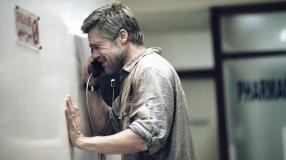
Of the three films he has done, Iñárritu responded,
Babel has the most straightforward chronological linear narrative. He doesn't think it was too difficult to get. Only Brad Pitt's phone call played with the narrative continuity, backtracking a bit to reflect that Amelia's Mexican story actually started a day after Brad and Cate's characters were in the Moroccan hospital. Time, Iñárritu offered, is a great tool to use in the cinema. Experiencing cinema is always in and of itself an emotional, fragmented experience. To have a film where scenes are shot in different locations, different times, where editing fuels juxtapositions, makes films dramatic. How audiences then fill the gaps with their own brains is what makes cinema beautiful. Iñárritu claimed he takes advantage of these narrative devices because time as a tool provides great tension. The extreme exercise for that was
21 Grams. That was an extreme, experimental use of time. But he liked it and felt it helped the story.
Iñárritu was asked about his reliance on global perspectives. He replied that, as a Mexican citizen, as a Third World citizen, he hadn't been exposed to a lot of American film as he was growing up, but, from what he had seen, it seemed American films often only showed one side of the story, one vision. In war films you saw one side of the battle. Kurosawa's
Rashomon was Iñárritu's first experience of a cinematic narrative that provided relative perspective, where the audience was allowed to see and experience the three perspectives on the crime by its victims, which Iñárritu thinks is important to understand the whole situation. A good novelist, he offered, makes you aware of each character's consciousness and you become so involved in a good novel that you can practically smell it. Films don't always do that. When he was young, he would think about the other guys in the war. Why were the Germans always bad? Maybe there were young German soldiers who were likewise victimized by Nazism and why shouldn't they have a voice? He objected to a Manichean division of good and evil and, in his own films, has struggled to fight against such polarized morality. One of the things Iñárritu likes in characterizations is contradiction. The more contradictory a character, the more interesting, the more human. Human beings are not exclusively good or bad. They are both good
and bad at the same time. The more he inspects that, the more interesting it becomes for him. A Manichean approach to characterization makes them the stuff of melodramatic soap operas, and Iñárritu is more interested in complex characterizations. Because he was first a Mexican citizen who then moved away from that comfort zone to the United States with his family, he has a perspective of being both the insider and the outsider, the native and the migrant. Without that perspective, he could not have conceived the border complexities of
Babel.
At this stage of the Q&A, my blood was beginning to chill with all this talk about
his movie,
his script,
his perspectives. I felt it necessary to grant credit to Guillermo Arriaga so—as diplomatically as I could—I stressed that the script
was amazing and that it was my understanding that—contrary to the presumption of the audience—it had been written not by Iñárritu but by Guillermo Arriaga. I asked him to speak about their creative dynamic and—since it was rumored their creative collaboration was winding down—where
his own writing was heading?
To his credit, Iñárritu looked me straight in the eye and graciously responded that their's has been a very beautiful and provocative nine-year relation, a strong and intense collaboration, that began with
Amores Perros. Every film, he conjectured, is made in different stages and the first stage—which is so great—is when you dream and theorize about what film you can make. At that stage, Iñárritu offered, Guillermo has been an extremely amazing collaborator because of their shared vision. Even when they obviously saw things differently, when they argued about things, about what was good or what was wrong for one character or one story, that intensity ultimately was of benefit to the story itself. It's an intense interminable exchange of ideas and processes that has been good. Iñárritu added that Arriaga is now interested in producing a film, and wants to direct, so from now on he will explore that while Iñárritu explores stories he has been working on independently for some time and which now he can pursue more thoroughly. "But we are very proud, both of us, of what we have accomplished in this relation."
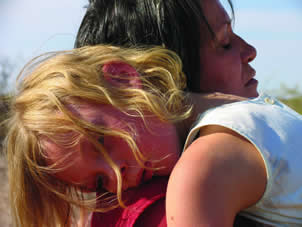
Iñárritu was asked what was the seed of the film's complex story and from where it had evolved? He said for him it had evolved from a moral position. After two years of living in the United States while developing
21 Grams, he felt a need to talk about what was going on in the world. He had arrived in Los Angeles four days before 9/11. The country changed. The world changed. He began to think how one little decision made by some guy in another country could result in family trauma and tragedy 20,000 miles away. He wondered if that "human tsunami" could ever be understood from one side or the other, if they would ever know each other? He felt
Babel, with its three continents and its four stories, would be a great way to end the trilogy, first local, then foreign, then this butterfly effect where the flapping of delicate wings in one part of the world produced a horrific storm on the other side of the world. He invited Arriaga to collaborate and they started talking, how they could make this idea work through characters who would never touch or see each other. That was the exercise predicated upon their moral commitment. In the beginning they had drafted more political scenes, governments talking between each other, that sort of thing, but he decided to back away from that focus on politicians, to make the film more about the politics of human interaction and how the world can be reflected in those stories.
At this juncture festival programmer Zoë Elton joined Iñárritu and Fishkin on stage to present Iñárritu with MVFF's Spotlight Award. He accepted it nervously but happily, stating that his journey—which started a year and a half ago—has ended so beautifully with this acknowledgment of his work. He recapitulated the journey's challenges, one of the biggest of which was to find the visual language to put together these four, diverse stories to create one piece that held sense and meaning. Often he didn't think he was going to succeed, that he was losing his mind and his hope, challenged on every level—intellectually, spiritually, physically—and to now receive this award recognizing the body of his work made him feel humble and excited. He paused and admitted that at this point he didn't quite know what he was saying. His audience laughed. But he was clear on being glad that his wife and children were there to share the moment with him. Life is beautiful, he concluded, and love is the solution and our only way out of our problems.
Cross-posted on
Twitch.
03/30/07 UPDATE: Lennon Aldort has created a music video for
Babel combining edited footage with Mozart's
Lacrimosa. It's a creative piece that registers much emotion.









